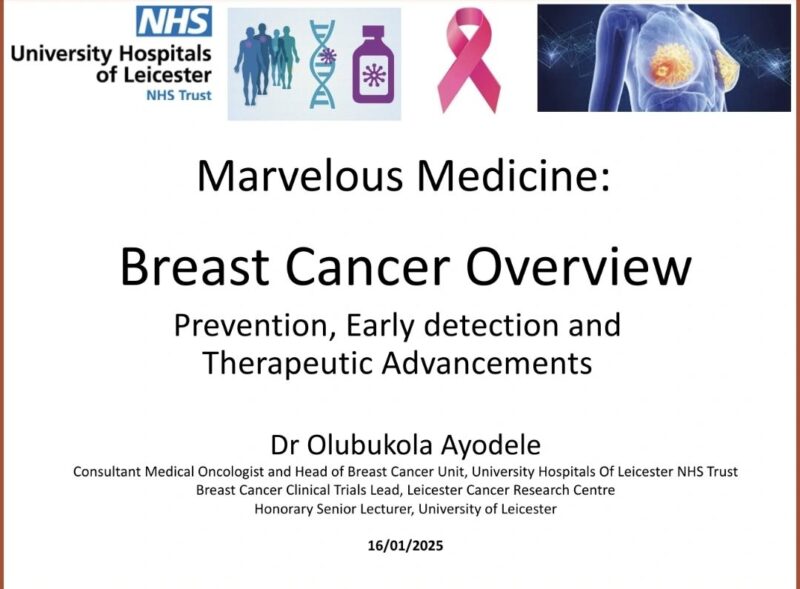“It was a pleasure and an amazing opportunity to be the first Marvellous Medicine speaker of the year at the University Hospitals of Leicester NHS Trust organised by the brilliant patient engagement team Osas Adetutu and Karl Mayes.
Marvellous Medicine is a way to offer the public insights to important topics and opportunities for the public to have their questions answered.
I shared insights on breast cancer including presentation and stages, myths and misconceptions, prevention and techniques for early detection. I also focused on the growing concern about the increasing incidence of breast cancer in young women.
While breast cancer rates overall have improved due to early detection and better treatments, the increase in cases among women under 40 is cause for concern. Breast cancer has long been associated with older age but this is fast changing.
Why Does This Matter?
Delayed Diagnosis: Breast cancer in young women is often diagnosed at later stages due to misconceptions that it is a ‘disease of older women.’ This delay significantly impacts treatment options and outcomes. Also, the current screening program is only available to women aged 50-71 years excluding this vulnerable population.
Aggressive Subtypes: Younger women are more likely to develop aggressive types of breast cancer, such as triple-negative breast cancer, which are harder to treat and have poorer prognoses.
Impact on Life Trajectory: Breast cancer at a young age can disrupt education, careers, relationships, and family planning, with long-lasting psychological and financial consequences.
What Can Be Done?
Awareness is Key: Young women need to know that they are not immune. Regular self-exams and understanding personal risk factors, such as family history or genetic predispositions, are crucial.
Self breast examination is a powerful tool to empower oneself and it’s important to start young. Girls from their first menstrual cycle should be taught how to examine their breast/chest so that it becomes routine.
Advocating for Early Detection: Healthcare providers must take symptoms in young women seriously and ensure timely diagnostic testing, such as ultrasounds or MRIs when necessary.
Support Systems Matter: Tailored support networks for younger patients can help address unique challenges like fertility preservation, mental health, and navigating careers during treatment.
Breast cancer in young women is a wake-up call for us all — healthcare providers, researchers, and the broader community. We must work together to raise awareness, advocate for early detection, and support those affected by this life-changing disease.
Let’s continue the conversation: What more can we do to tackle this growing issue? I would like to hear from you. Your insights and stories can make a difference.
Repost and share to your wider community to increase awareness.”

More posts featuring Olubukola Ayodele.


